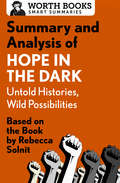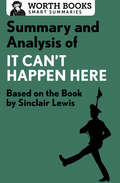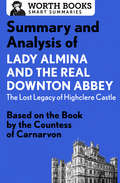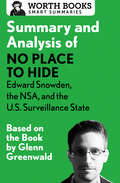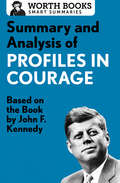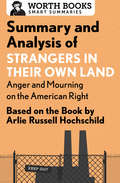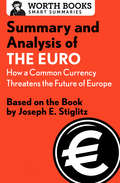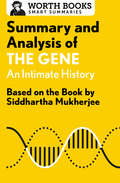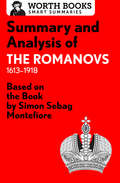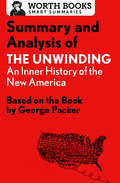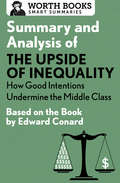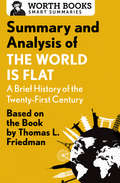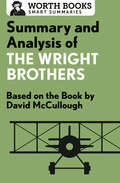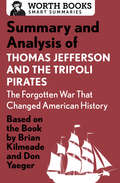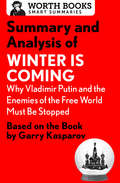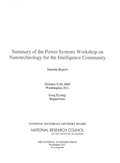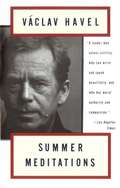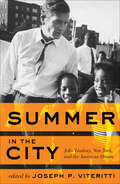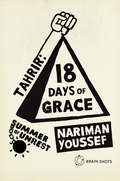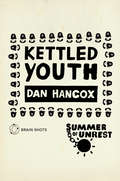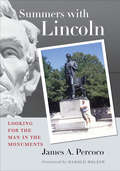- Table View
- List View
Summary and Analysis of Hope in the Dark: Based on the Book by Rebecca Solnit
by Worth BooksSo much to read, so little time? This brief overview of Hope in the Dark tells you what you need to know—before or after you read Rebecca Solnit’s book. Crafted and edited with care, Worth Books set the standard for quality and give you the tools you need to be a well-informed reader. This short summary and analysis of Hope in the Dark includes: Historical contextChapter-by-chapter overviewsProfiles of the main charactersDetailed timeline of eventsImportant quotes and analysisFascinating triviaGlossary of termsSupporting material to enhance your understanding of the original workAbout Hope in the Dark: Untold Histories, Wild Possibilities by Rebecca Solnit: Written in response to the 2004 US presidential election, and updated during the 2016 race, Rebecca Solnit’s Hope in the Dark is a call to action for people who find themselves despairing about the political climate of the world today. Hope in the Dark is a long essay that serves as a primer on social and environmental activism and uprisings from the mid-to-late 20th century to the present. Solnit uses this history of protesters, writers, and workers to argue that hope is the necessary catalyst for action. She insists that radicals and revolutionaries must hold onto hope in order to create a world more like the one they want to live in, even in the face of enormous obstacles, and especially in the face of uncertainty. The summary and analysis in this ebook are intended to complement your reading experience and bring you closer to a great work of nonfiction.
Summary and Analysis of It Can't Happen Here: Based on the Book by Sinclair Lewis (Smart Summaries)
by Worth BooksSo much to read, so little time? This brief overview of It Can&’t Happen Here tells you what you need to know—before or after you read Sinclair Lewis&’s book. Crafted and edited with care, Worth Books set the standard for quality and give you the tools you need to be a well-informed reader. This short summary and analysis of It Can&’t Happen Here includes: Historical contextChapter-by-chapter overviewsProfiles of the main charactersDetailed timeline of key eventsThemes and symbolsImportant quotes and analysisFascinating triviaGlossary of termsSupporting material to enhance your understanding of the original work About It Can&’t Happen Here by Sinclair Lewis: Sinclair Lewis&’s satirical novel It Can&’t Happen Here documents the rise of a fascist government in the United States. It follows a small town newspaper editor, Doremus Jessup, as he watches his country come out of economic depression only to embrace a smoke-and-mirrors presidential candidate who wraps himself in patriotic zeal. This charismatic demagogue and his cronies amass power and wealth as the rest of the population watches its rights and freedoms disappear. There is censorship, the random violence of an unchecked paramilitary force, and the emergence of concentration camps. Jews, foreigners, and intellectuals are singled out for especially brutal treatment. Universities are taken over and books are burned. As he watches the devastating toll exacted from his friends and family, the once easygoing Jessup is swept into an underground resistance movement in which he must ignore his moral compass. A revolution is launched, but the outcome is uncertain. Lewis&’s dystopian work asks: could it happen here and, if it does, how would it be stopped? The summary and analysis in this ebook are intended to complement your reading experience and bring you closer to a great work of fiction.
Summary and Analysis of Lady Almina and the Real Downton Abbey: Based on the Book by the Countess of Carnarvon
by Worth BooksSo much to read, so little time? This brief overview of Lady Almina and the Real Downton Abbey tells you what you need to know—before or after you read the Countess of Carnarvon’s book. Crafted and edited with care, Worth Books set the standard for quality and give you the tools you need to be a well-informed reader. This short summary and analysis of Lady Almina and the Real Downton Abbey: The Lost Legacy of Highclere Castle includes: Historical contextChapter-by-chapter overviewsProfiles of the main charactersDetailed timeline of key eventsImportant quotesFascinating triviaGlossary of termsSupporting material to enhance your understanding of the original work About Lady Almina and the Real Downton Abbey by the Countess of Carnarvon: Lady Almina, the 5th Countess of Carnarvon, was known for throwing fabulous parties at Highclere Castle during the Edwardian era and for turning her home into a hospital for wounded soldiers during World War I. Her biography provides a view of what it was like to live during a time of great joy and of immense sorrow, all in the place that inspired the Emmy Award–winning period drama Downton Abbey. Lady Fiona Carnarvon, the 8th Countess of Carnarvon, knows Highclere Castle—her current residence, which has been in her husband’s family since 1679—better than just about anyone. Drawing from the family’s personal archives of photographs, letters, household records, and journals, Lady Fiona give readers an inside view of the famous English country home and the remarkable woman at the center of it all. The summary and analysis in this ebook are intended to complement your reading experience and bring you closer to a great work of nonfiction.
Summary and Analysis of No Place to Hide: Based on the Book by Glenn Greenwald (Smart Summaries)
by Worth BooksSo much to read, so little time? This brief overview of No Place to Hide tells you what you need to know—before or after you read Glenn Greenwald&’s book. Crafted and edited with care, Worth Books set the standard for quality and give you the tools you need to be a well-informed reader. This short summary and analysis of No Place to Hide includes: Historical contextChapter-by-chapter overviewsCharacter profilesDetailed timeline of key eventsImportant quotes and analysisFascinating triviaGlossary of termsSupporting material to enhance your understanding of the original workAbout No Place to Hide: Edward Snowden, the NSA, and the U.S. Surveillance State by Glenn Greenwald: Journalist and constitutional lawyer Glenn Greenwald&’s No Place to Hide is a personal narrative about his communication with Edward Snowden and an extensive exploration of the true nature, size, and impact of global NSA surveillance. Greenwald&’s book is a fascinating firsthand account that explores issues of privacy in the digital age; the reach of the NSA; and its power to watch our every move, monitor trade negotiations, and coerce citizens into action. The summary and analysis in this ebook are intended to complement your reading experience and bring you closer to a great work of nonfiction.
Summary and Analysis of Profiles in Courage: Based on the Book by John F. Kennedy (Smart Summaries)
by Worth BooksSo much to read, so little time? This brief overview of Profiles in Courage tells you what you need to know—before or after you read John F. Kennedy&’s book. Crafted and edited with care, Worth Books set the standard for quality and give you the tools you need to be a well-informed reader. This short summary and analysis of Profiles in Courage includes: Historical contextChapter-by-chapter overviewsProfiles of the main charactersDetailed timeline of key eventsImportant quotesFascinating triviaGlossary of termsSupporting material to enhance your understanding of the original work About Profiles in Courage by John F. Kennedy: John F. Kennedy&’s Profiles in Courage takes an in-depth look at eight US senators who displayed courage by going against their political party&’s platform and acting on integrity and convictions. These timeless stories of political courage and inner strength are no less poignant today than upon the book&’s original publication in 1955. The summary and analysis in this ebook are intended to complement your reading experience and bring you closer to a great work of nonfiction.
Summary and Analysis of Strangers in Their Own Land: Based on the Book by Arlie Russell Hochschild (Smart Summaries)
by Worth BooksSo much to read, so little time? This brief overview of Strangers in Their Own Land tells you what you need to know—before or after you read Arlie Russell Hochschild&’s book. Crafted and edited with care, Worth Books set the standard for quality and give you the tools you need to be a well-informed reader. This short summary and analysis of Strangers in Their Own Land: Anger and Mourning on the American Right includes: Historical contextChapter-by-chapter overviewsCharacter profilesDetailed timeline of eventsImportant quotesFascinating triviaGlossary of termsSupporting material to enhance your understanding of the original work About Strangers in Their Own Land by Arlie Russell Hochschild: Renowned sociologist Arlie Russell Hochschild seeks to understand why some American conservatives continue to vote for policies that ultimately harm them. She traveled to Louisiana to complete a five-year study, talking to members of the Tea Party and attempting to breach the &“empathy wall&” that stands between conservatives and liberals. A compassionate observer, Hochschild pursues the heart of the &“deeper story,&” blaming the narrative—not her subjects—that informs these peoples&’ choices. She particularly examines the long history of environmental pollution in the region and the state governments&’ failure to address it—a failure that this political faction refuses to condemn. Strangers in Their Own Land is a compelling analysis of one of the most important factors in American culture today, and Hochschild&’s measured and empathic approach leads her readers toward a greater understanding of their fellow citizens. The summary and analysis in this ebook are intended to complement your reading experience and bring you closer to a great work of nonfiction.
Summary and Analysis of The Euro: Based on the Book by Joseph E. Stiglitz
by Worth BooksSo much to read, so little time? This brief overview of The Euro tells you what you need to know—before or after you read Joseph E. Sitglitz’s book. Crafted and edited with care, Worth Books set the standard for quality and give you the tools you need to be a well-informed reader. This short summary and analysis of The Euro by Joseph E. Stiglitz includes: Historical contextChapter-by-chapter summariesProfiles of the main charactersImportant quotesFascinating triviaGlossary of termsSupporting material to enhance your understanding of the original work About The Euro by Joseph E. Stiglitz: In The Euro, Columbia Business School professor and Nobel Prize–winning economist author Joseph E. Stiglitz argues that the fundamental cause of the Eurozone’s recent economic difficulties was the creation of a single currency without the institutions to support it. The euro bound 19 countries with very different economies—and very different views about economics—together, but it did not include the institutions or rules to make such a union succeed. The results of this union are clear: although the United States has experienced growth since the financial crisis, Europe is stagnant and Eurozone unemployment remains over 10%. New York Times bestselling author Joseph Stiglitz outlines three possible ways forward: fundamental reforms to the current system, an end to the single currency experiment, or a new system entirely. The Euro is required reading for all citizens of today’s globalized world. The summary and analysis in this ebook are intended to complement your reading experience and bring you closer to a great work of nonfiction.
Summary and Analysis of The Gene: Based on the Book by Siddhartha Mukherjee
by Worth BooksSo much to read, so little time? This brief overview of The Gene tells you what you need to know--before or after you read Siddhartha Mukherjee's book. Crafted and edited with care, Worth Books set the standard for quality and give you the tools you need to be a well-informed reader. This short summary and analysis of The Gene by Siddhartha Mukherjee includes: Historical contextChapter-by-chapter summariesDetailed timeline of key eventsImportant quotesFascinating triviaGlossary of termsSupporting material to enhance your understanding of the original work About Siddhartha Mukherjee's The Gene: From the Pulitzer Prize-winning author of The Emperor of All Maladies, The Gene is a rigorously scientific, broadly historical, and candidly personal account of the development of the science of genetics, the dramatic ways genes can affect us, and the enormous moral questions posed by our ability to manipulate them. As Siddhartha Mukherjee maps out the fascinating biography of the gene, from research and experimentation to scientific breakthroughs, he always returns to the narrative of his own family's tragic history of mental illness, reminding us that despite our huge leaps in knowledge, there is still much we do not understand about the incredibly complex human genome. The Gene is an important read for anyone concerned about a future that may redefine what it means to be human. The summary and analysis in this ebook are intended to complement your reading experience and bring you closer to a great work of nonfiction.
Summary and Analysis of The Romanovs: Based on the Book by Simon Sebag Montefiore
by Worth BooksSo much to read, so little time? This brief overview of The Romanovs tells you what you need to know—before or after you read Simon Sebag Montefiore’s book. Crafted and edited with care, Worth Books set the standard for quality and give you the tools you need to be a well-informed reader. This short summary and analysis of The Romanovs: 1613–1918 includes: Historical contextChapter-by-chapter overviewsImportant quotesFascinating triviaGlossary of termsSupporting material to enhance your understanding of the original workAbout The Romanovs by Simon Sebag Montefiore: Award-winning historian Simon Sebag Montefiore’s The Romanovs delves into the reign of the Romanovs, Russia’s most infamous ruling family, showing how the formidable clan rose to power and held on to it for more than three hundred years. In a sweeping chronological narrative of tsars and tsarinas, Sebag Montefiore’s well-researched biography details the drama that characterized Russia’s greatest dynasty, shedding light on the monarchs’ lives and actions. Beginning with Michael’s accession in 1613—marking the end of the Time of Troubles—and ending with the family’s tragic massacre in 1918, The Romanovs shows how generations of Russian tsars ruled autocratically, through violence, greed, and intrigue. The summary and analysis in this ebook are intended to complement your reading experience and bring you closer to a great work of nonfiction.
Summary and Analysis of The Unwinding: Based on the Book by George Packer
by Worth BooksSo much to read, so little time? This brief overview of The Unwinding tells you what you need to know—before or after you read George Packer’s book. Crafted and edited with care, Worth Books set the standard for quality and give you the tools you need to be a well-informed reader. This short summary and analysis of The Unwinding: An Inner History of the New America includes: Historical contextChapter-by-chapter overviewsProfiles of the main charactersDetailed timeline of key eventsImportant quotesFascinating triviaGlossary of termsSupporting material to enhance your understanding of the original work About The Unwinding by George Packer: Detailing the United States’ decline in the latter half of the twentieth century, journalist George Packer’s The Unwinding reads like a memoir but contains the hard-hitting facts of an exposé. Packer’s history of America looks at a cast of interesting figures—from community organizers to laborers, Democratic Party staffers to small business owners—including household names such as Oprah Winfrey, Colin Powell, Raymond Carver, Jay-Z, and Elizabeth Warren, to produce a stunning portrait of what the United States has become and where it’s headed next. The Unwinding won the National Book Award, was a National Book Circle Award finalist, and was named by the New York Times as one of the best books to read to understand the Trump presidency. The summary and analysis in this ebook are intended to complement your reading experience and bring you closer to a great work of nonfiction.
Summary and Analysis of The Upside of Inequality: Based on the Book by Edward Conrad
by Worth BooksSummary and Analysis of The Upside of Inequality: How Good Intentions Undermine the Middle Class Based on the Book by Edward Conard So much to read, so little time? This brief overview of The Upside of Inequality tells you what you need to know—before or after you read Edward Conard’s book. Crafted and edited with care, Worth Books set the standard for quality and give you the tools you need to be a well-informed reader. This short summary and analysis of The Upside of Inequality includes: Historical contextChapter-by-chapter overviewsImportant quotesFascinating triviaGlossary of termsSupporting material to enhance your understanding of the original workAbout The Upside of Inequality: How Good Intentions Undermine the Middle Class by Edward Conard: New York Times–bestselling author Edward Conard argues in favor of an American economic system that results in massive income inequality. Breaking down the causes of inequality while dispelling many of the myths surrounding stagnating wages and financial disparity for the the lower and middle classes, Conard dismisses the call for wealth redistribution. He, instead, makes the case for lower taxes, less regulation of banks, restricted immigration, and lower trade deficits. The summary and analysis in this ebook are intended to complement your reading experience and bring you closer to a great work of nonfiction.
Summary and Analysis of The World Is Flat 3.0: Based on the Book by Thomas L. Friedman (Smart Summaries)
by Worth BooksSo much to read, so little time? This brief overview of The World Is Flat: A Brief History of the Twenty-First Century tells you what you need to know—before or after you read Thomas L. Friedman &’s book. Crafted and edited with care, Worth Books set the standard for quality and give you the tools you need to be a well-informed reader. This short summary and analysis of The World Is Flat 3.0 by Thomas L. Friedman includes: Historical contextChapter-by-chapter summariesDetailed timeline of important eventsImportant quotesFascinating triviaSupporting material to enhance your understanding of the original work About The World Is Flat 3.0 by Thomas L. Friedman: Pulitzer Prize–winning author Thomas L. Friedman imagines himself a modern-day Columbus, exploring a new world created by a global economy. He travels from Bangalore to Bentonville, interviewing key figures in the rise of globalization, outsourcing, offshoring, and supply chain management. Like great explorers before him, Friedman spins tales of vast wealth and freedoms made possible by advances in technology. But here, too, there be dragons: foreign competition, educational failures, governmental incompetence, and the specter of 9/11 and terrorism are the ugly flip side of crowd-sourced technological wonders. The World Is Flat is an essential work for anyone interested in the impact of globalization. The summary and analysis in this ebook are intended to complement your reading experience and bring you closer to a great work of nonfiction.
Summary and Analysis of The Wright Brothers: Based on the Book by David McCullough
by Worth BooksSo much to read, so little time? This brief overview of The Wright Brothers tells you what you need to know--before or after you read David McCullough's book. Crafted and edited with care, Worth Books set the standard for quality and give you the tools you need to be a well-informed reader. This short summary and analysis of The Wright Brothers by David McCullough includes: Historical contextChapter-by-chapter summariesDetailed timeline of key eventsImportant quotesFascinating triviaGlossary of termsSupporting material to enhance your understanding of the original work About David McCullough's The Wright Brothers: Two-time Pulitzer Prize winner David McCullough's biography is a fresh, personal account of Wilbur and Orville Wright: two young men from the American Midwest who, armed with dedication, ingenuity, and the skills they acquired as bicycle mechanics, invented the first practical airplane in history. Based on extensive research--including the brothers' personal correspondence and diaries--The Wright Brothers brings these two iconic American heroes to life as never before. More than the chronicle of an invention, The Wright Brothers is the story of an American family whose belief in the values of hard work and perseverance made all things seem possible--even the conquest of the skies. The summary and analysis in this ebook are intended to complement your reading experience and bring you closer to a great work of nonfiction.
Summary and Analysis of Thomas Jefferson and the Tripoli Pirates: Based on the Book by Brian Kilmeade & Don Yaeger (Smart Summaries)
by Worth BooksSo much to read, so little time? This brief overview of Thomas Jefferson and the Tripoli Pirates tells you what you need to know—before or after you read Brian Kilmeade and Don Yaeger&’s book. Crafted and edited with care, Worth Books set the standard for quality and give you the tools you need to be a well-informed reader. This short summary and analysis of Thomas Jefferson and the Tripoli Pirates by Brian Kilmeade and Don Yaeger includes: Historical contextChapter-by-chapter summariesImportant quotesFascinating triviaGlossary of termsSupporting material to enhance your understanding of the original workAbout Thomas Jefferson and the Tripoli Pirates by Brian Kilmeade and Don Yaeger: In 1785, US merchant ships that sailed the Mediterranean Sea began to face an unexpected threat: pirates from the North African coast. American sailors were subjected to pillage and enslavement while their government tried to negotiate tributes and ransom prices with the Islamic rulers of the Barbary nations. As the Barbary conflict intensified, Thomas Jefferson saw that negotiations could only proceed if the United States showed its military strength through a naval presence and the use of force in the Mediterranean. Jefferson committed himself to this cause as he rose to the position of secretary of state and later, president of the United States. In Thomas Jefferson and the Tripoli Pirates: The Forgotten War that Changed American History, authors Brian Kilmeade and Don Yaeger trace the exciting tale of how these kidnappings led to the First Barbary War, what transpired between the warring nations, and how Thomas Jefferson&’s decisions helped shape US policy today. The summary and analysis in this ebook are intended to complement your reading experience and bring you closer to a great work of nonfiction.
Summary and Analysis of Washington's Spies: Based on the Book by Alexander Rose
by Worth BooksSo much to read, so little time? This brief overview of Washington’s Spies tells you what you need to know—before or after you read Alexander Rose’s book. Crafted and edited with care, Worth Books set the standard for quality and give you the tools you need to be a well-informed reader. This short summary and analysis of Washington’s Spies includes: Historical contextChapter-by-chapter overviewsProfiles of the main charactersDetailed timeline of key eventsImportant quotesFascinating triviaGlossary of termsSupporting material to enhance your understanding of the original work About Washington’s Spies: The Story of America’s First Spy Ring by Alexander Rose: Alexander Rose’s New York Times–bestselling book Washington’s Spies offers an in-depth account of the network of men who operated covertly under George Washington’s command during the Revolutionary War. These men, referred to as the Culper Ring, worked largely in southern New York, sending and receiving coded messages from across Manhattan to Long Island, and getting crucial British intelligence to General Washington. Rose delves into the varied personalities and motivations of the Culper Ring, explores the espionage techniques of the time, including encryption and the use of invisible ink, and describes the differences in the British and American methods of gathering intelligence. Washington’s Spies inspired the television series Turn, with author Alexander Rose serving as a historical consultant and producer. The summary and analysis in this ebook are intended to complement your reading experience and bring you closer to a great work of nonfiction.
Summary and Analysis of Winter Is Coming: Based on the Book by Garry Kasparov
by Worth BooksSo much to read, so little time? This brief overview of Winter Is Coming tells you what you need to know—before or after you read Garry Kasparov’s book. Crafted and edited with care, Worth Books set the standard for quality and give you the tools you need to be a well-informed reader. This short summary and analysis of Winter Is Coming includes: Historical contextChapter-by-chapter overviewsProfiles of the main charactersDetailed timeline of key eventsImportant quotesFascinating triviaGlossary of termsSupporting material to enhance your understanding of the original workAbout Winter Is Coming: Why Vladimir Putin and the Enemies of the Free World Must Be Stopped by Garry Kasparov: Winter Is Coming tells the story of Vladimir Putin’s stunning rise to power—and is a dire warning. Beginning with the fall of the Soviet Union, Russian dissident and chess champion Garry Kasparov traces the circumstances that allowed Putin to flourish, including Russia’s aborted attempt at democracy under Boris Yeltsin and the Chechen Wars. Despite Putin’s constant and ruthless assaults on civil liberties and international diplomacy—including his botched hostage negotiations in Beslan, corruption and voter fraud, the imprisonment and murders of protesters and opposition figures, and the annexation of the Crimea region in Ukraine—the West and the UN continue to acquiesce to his demands, making him stronger. Learn why Garry Kasparov likens Putin to Adolf Hitler of the 1930s and why he believes that if no one steps in to stop him, the consequences could be disastrous. The summary and analysis in this ebook are intended to complement your reading experience and bring you closer to a great work of nonfiction.
Summary of the Power Systems Workshop on Nanotechnology for the Intelligence Community: Interim Report
by National Materials Advisory BoardThe emergence of nanotechnology as a major science and technology research topic has sparked substantial interest by the intelligence community. In particular the community is interested both in the potential for nanotechnology to assist intelligence operations and threats it could create. To explore these questions, the Intelligence Technology Innovation Center asked the National Research Council to conduct a number of activities to illustrate the potential for nanotechnology to address key intelligence community needs. The first of these was a workshop to explore technology opportunities and challenges in power systems that could be addressed by nanotechnology. This report presents a summary of that workshop. It includes an overview of power technologies and discussions on nanoscale properties of energy storage materials, device experience, manufacturing and material handling considerations, and natural power.
Summer Meditations
by Paul Wilson Václav Havel<p>In a book written while he was president of Czechoslovakia, Vaclav Havel combines the same powerful eloquence, moral passion, and abiding wisdom that informed his writing as a dissident and playwright, with a candor unprecedented from one with the broad perspective and infinite responsibility of governing a country. <p>Havel, now president of the Czech Republic, addresses the legacy of Communism as the euphoria of the Velvet Revolution gives way to a more problematic reality. Yet even as he grapples with the challenges of political change, he affirms his belief in a politics motivated by moral responsibility; in an economy tempered by compassion; and in the central roles of art and culture in the transformation of society. Summer Meditations is not only a timely and necessary testament of events in Eastern Europe but a profound reflection upon the nature and practice of politics and a stirring call for morality, civility, and openness in public life throughout the world.</p>
Summer in the City: John Lindsay, New York, and the American Dream
by Joseph P. ViterittiThe history, policies, and legacy of John Lindsay, mayor of New York City from 1966 to 1973.Summer in the City takes a clear look at John Lindsay’s tenure as mayor of New York City during the tumultuous 1960s, when President Lyndon Johnson launched his ambitious Great Society Program. Providing an even-handed reassessment of Lindsay’s legacy and the policies of the period, the essays in this volume skillfully dissect his kaleidoscope of progressive ideas and approach to leadership—all set in a perfect storm of huge demographic changes, growing fiscal stress, and an unprecedented commitment by the federal government to attain a more equal society. Compelling archival photos and a timeline give readers a window into the mythic 1960s, a period animated by civil rights marches, demands for black power, antiwar demonstrations, and a heroic intergovernmental effort to redistribute national resources more evenly.Written by prize-winning authors and leading scholars, each chapter covers a distinct aspect of Lindsay’s mayoralty (politics, race relations, finance, public management, architecture, economic development, and the arts), while Joseph P. Viteritti’s introductory and concluding essays offer an honest and nuanced portrait of Lindsay and the prospects for shaping more balanced public priorities as New York City ushers in a new era of progressive leadership.The volume’s sharp focus on the controversies of the Mad Men era will appeal not only to older readers who witnessed its explosive events, but also to younger readers eager for a deeper understanding of the time. A progressive Republican with bold ideals and a fervent belief in the American Dream, Lindsay strove to harness the driving forces of modernization, democratization, acculturation, inclusion, growth, and social justice in ways that will inform our thinking about the future of the city.Contributors: Lizabeth Cohen, Paul Goldberger, Brian Goldstein, Geoffrey Kabaservice, Mariana Mogilevich, Charles R. Morris, David Rogers, Clarence Taylor, and Joseph P. Viteritti
Summer in the City: John Lindsay, New York, and the American Dream
by Joseph P. Viteritti“These first-rate essays provide a positive revaluation of [John Lindsay’s] mayoralty, a convincing defense of the progressive tradition he championed.” —Mike Wallace, Pulitzer Prize–winning coauthor of GothamSummer in the City takes a clear look at John Lindsay’s tenure as mayor of New York City during the tumultuous 1960s, when President Lyndon Johnson launched his ambitious Great Society Program. Providing an even-handed reassessment of Lindsay’s legacy and the policies of the period, the essays in this volume skillfully dissect his kaleidoscope of progressive ideas and approach to leadership—all set in a perfect storm of huge demographic changes, growing fiscal stress, and an unprecedented commitment by the federal government to attain a more equal society. Compelling archival photos and a timeline give readers a window into the mythic 1960s, a period animated by civil rights marches, demands for black power, antiwar demonstrations, and a heroic intergovernmental effort to redistribute national resources more evenly.Written by prize-winning authors and leading scholars, each chapter covers a distinct aspect of Lindsay’s mayoralty (politics, race relations, finance, public management, architecture, economic development, and the arts), while Joseph P. Viteritti’s introductory and concluding essays offer an honest and nuanced portrait of Lindsay and the prospects for shaping more balanced public priorities as New York City ushers in a new era of progressive leadership.“Summer in the City artfully balances the interplay of leadership, ideas about urbanism that were prevalent at the time, and deep political, intergovernmental, demographic, and economic structural forces at play in the 1960s, producing the best volume about Mayor John Lindsay ever published.” —Richard Flanagan, City University of New York
Summer of Hate: Charlottesville, USA
by Hawes SpencerIn August 2017, violence erupted in Charlottesville, Virginia, during two days of demonstrations by white supremacists, neo-Nazis, and counterprotesters, including members of antifa and Black Lives Matter. Ostensibly motivated by the city’s plans to remove Confederate statues from two public parks, members of the alt-right descended first on the University of Virginia and then, disastrously, on the city’s downtown. As these violent and ultimately deadly events gripped the attention of the nation, extensive coverage in both mainstream and fringe media promulgated competing narratives. Summer of Hate is the investigative journalist Hawes Spencer’s unbiased, probing account of August 11 and 12. Telling the story from the perspectives of figures on all sides of the demonstrations, Spencer, who reported from Charlottesville for the New York Times, carefully recreates what happened and why. Focusing on individuals including activists, city councilors, faith leaders, and the police, Spencer creates an objective, panoramic narrative that renders these dramatic events, and the ongoing conflicts underlying them, in all their complexity.
Summer of My Amazing Luck: A Novel
by Miriam Toews"[A] memorable portrait of a struggling young person who finds unexpected resilience and peace . . . Hilarious, heartbreaking, and poignant." —BooklistMiriam Toews welcomes her readers to the Have–a–Life housing project (better known as Half–a–Life). The welfare regulations are endless and the rate–fink neighbors won't mind their own business. Lucy Von Alstyne sends fictitious letters to her friend Alicia, pretending to be the father of Alicia's twins. When the two mothers and their five children set off on a journey to find him, facing along the way the complications of living in poverty and raising fatherless children, Lucy discovers this just may be the summer of her amazing luck.
Summer of Unrest: Tahrir - 18 Days of Grace
by Nariman YoussefOn 25th January this year 50,000 people descended on Tahrir Square in Cairo to protest against president Hosni Mubarak. What followed was an extraordinary 18 days when the square became the focal point for the hopes and fears of Egypt's people, in a situation often joyous but also intense, as the military moved in and Mubarak supporters began to infiltrate the area.Nariman Youssef was in Tahrir Square during this extraordinary gathering. This ebook for the Summer of Unrest series is a gripping diary of that time until Mubarak stepped down on 11th February, which saw the crowds in the square swell to 1 million at one point. As well as an extraordinary insight from within the most important uprising in the Arab Spring, Youssef pulls back to document the signposts to, and issues that fueled, the surge for democratic change in Egypt, exploding myths and uncovering hidden truths as she goes.BRAIN SHOTS is the pre-eminent source for high quality, short-form digital non-fiction. The Summer of Unrest series brings together stellar writers to explore the issues surrounding the austerity measures in the UK, uprisings in the Middle East and the nature of the protest movements springing up all over the world.
Summer of Unrest: The Battle Against the Neoliberal Endgame
by Dan Hancox"Those who do not move, do not notice their chains." - Rosa LuxemburgIn this considered and polemical piece, Dan Hancox examines a world in which our fates are no longer governed by elected representatives with shirts and ties, but abstract finance. Where the problem is not so much false consciousness as blurred consciousness. He examines the 'spectacle of capitalism' that has stymied political activism for so long and how the closing months of 2010 saw a surge in rage that continues as the youth of Britain is waking up from its malaise in the face of provocation and the cuts programme.Beginning in the stifling kettle on Westminster Bridge, Hancox weaves on-the-ground reportage with political theory to describe and explain the growth of movements like UK Uncut, the University for Strategic Optimism and other actions to create a better society. An anthem for kettled youth, this ebook is a stake in the ground signalling the rebirth of the curiosity of a generation breaking free of its shackles.BRAIN SHOTS is the pre-eminent source for high quality, short-form digital non-fiction. The Summer of Unrest series brings together stellar writers to explore the issues surrounding the austerity measures in the UK, uprisings in the Middle East and the nature of the protest movements springing up all over the world.
Summers with Lincoln: Looking for the Man in the Monuments
by James A. PercocoA journey across America revealing &“the history of how seven of these monuments came to be . . . and what they mean to us today&” (The Washington Times). Across the country, in the middle of busy city squares and hidden on quiet streets, there are nearly two hundred statues erected in memory of Abraham Lincoln. No other American has ever been so widely commemorated. A few years ago, Jim Percoco, a history teacher with a passion for both Lincoln and public sculpture, set off to see what he might learn about some of these monuments—what they meant to their creators and to the public when they were unveiled, and what they mean to us today. The result is a fascinating chronicle of four summers on the road looking for Lincoln stories in statues of marble and bronze. Percoco selects seven emblematic works, among them Thomas Ball&’s Emancipation Group, erected east of the Capitol in 1876 with private funds from African Americans and dedicated by Frederick Douglass; Augustus Saint-Gaudens&’s majestic Standing Lincoln of 1887 in Chicago; Paul Manship&’s 1932 Lincoln the Hoosier Youth, in Fort Wayne, Indiana; and Gutzon Borglum&’s 1911 Seated Lincoln, struggling with the pain of leadership, beckoning visitors to sit next to him on his metal bench in Newark, New Jersey. At each stop, Percoco chronicles the history of the monument, spotlighting its artistic, social, political, and cultural origins. His descriptions draw fresh meaning from mute stone and cold metal—raising provocative questions not just about who Lincoln might have been, but about what we&’ve wanted him to be in the monuments we&’ve built.
